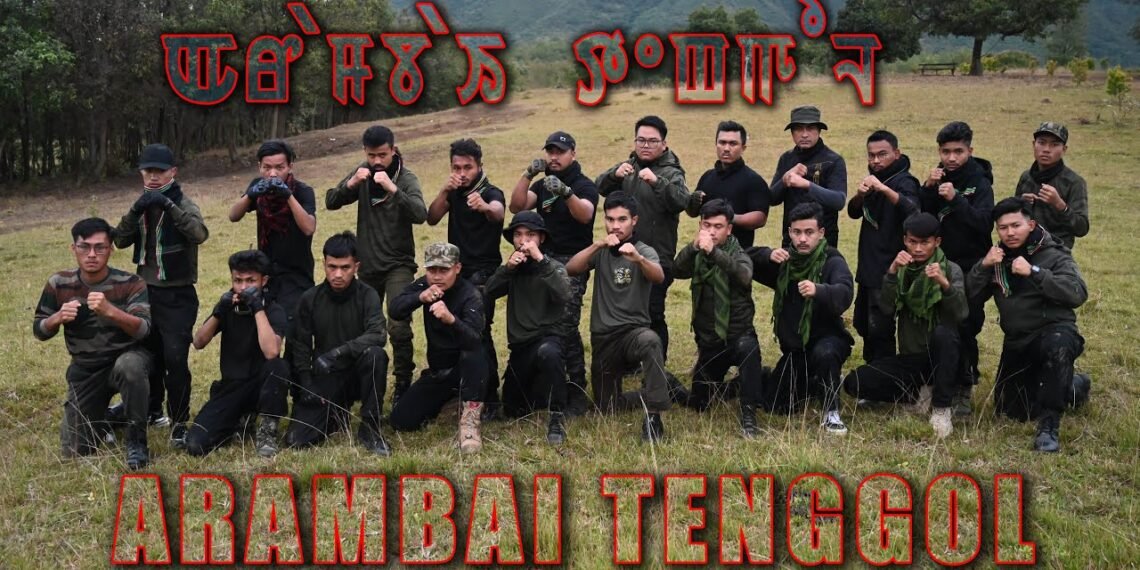September 5, 2025 — The Ministry of Home Affairs’ (MHA) decision to extend the Suspension of Operations (SoO) agreement with Kuki-Zo groups has exposed sharp divisions within Meitei civil society, with two of the valley’s most influential organisations — COCOMI and Arambai Tenggol — taking opposing stands.
The Coordinating Committee on Manipur Integrity (COCOMI) blasted the extension, branding the deal as a move that legitimises “narco-terrorist groups.” COCOMI leaders warned that the agreement undermines Manipur’s territorial integrity and accused New Delhi of rewarding armed groups implicated in ethnic violence.
READ: Manipur: After Ceasefire Extension, Kuki-Zo Groups Push for Union Territory
“This is not peace, this is legitimisation of terror,” a COCOMI spokesperson declared.
In contrast, Arambai Tenggol released a detailed press note on Friday welcoming the SoO extension as a necessary step to restore normalcy. The organisation stressed its consistent role in “cooperating and coordinating with the efforts of the Ministry of Home Affairs (MHA) and the State Administration to chart a positive path forward.”
“We are unwavering in our support for any initiative aimed at restoring order and establishing lasting tranquility within the state,” the statement read.
The group acknowledged concerns about the Kuki-Zo population, whom it described as being “largely comprised of illegal immigrants and refugees from Myanmar,” but argued that engagement under strict legal frameworks is preferable to unchecked conflict.
MHA Agreement Legitimises ‘Narco-Terrorist’ Groups: COCOMI https://t.co/rMua5dXnjL #COCOMI #SoOAgreement #ManipurCrisis #NarcoTerrorism #MeiteiVoices
— POWER CORRIDORS (@power_corridors) September 5, 2025
Call for NRC Implementation
Arambai Tenggol went further, pressing the Union government to implement a National Register of Citizens (NRC) in Manipur. The release stated:
“A robust mechanism such as the NRC could play a pivotal role in detecting and deporting illegal immigrants and refugees. By systematically documenting the legal status of individuals within the Kuki community, India can enhance its control over immigration while safeguarding its constitutional integrity.”
The group warned that Kuki defiance of government initiatives risks “undermining the trust and collaborative spirit necessary for peacebuilding,” adding that “a more stringent approach may be required” to manage the complexities of the conflict.
“Rule of Law Must Be Upheld”
The statement emphasised Arambai Tenggol’s willingness to cooperate with the Centre, but with a clear stress on law and order:
“Such actions make it evident that the rule of law must be upheld and respected,” said Laishram Robson, Control Room Operator of Arambai Tenggol.
“Our aim is to contribute constructively to all Governmental efforts that promote stability and a peaceful future for Manipur.”
A Divided Valley Voice
The contrasting stances between COCOMI and Arambai Tenggol underscore the fractured response within Meitei society. While both claim to defend Manipur’s interests, their strategies diverge: COCOMI flatly rejects any compromise with Kuki-Zo groups, whereas Arambai Tenggol frames the SoO as part of a broader path to stability, provided it is paired with legal safeguards like the NRC.
Analysts warn that this divide could complicate Meitei unity ahead of Prime Minister Narendra Modi’s scheduled visit to Churachandpur on September 13, where the optics of peace, reconciliation, and cultural coexistence remain hotly contested.
READ: Here is All You Want to Know About MHA–Kuki-Zo Agreement














